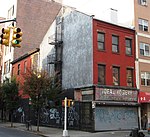Kossar's Bialys
Bakeries of the United StatesGrand Street (Manhattan)Jews and Judaism in ManhattanLower East SidePolish-Jewish culture in New York City ... and 5 more
Restaurants established in 1936Restaurants in ManhattanRussian-Jewish culture in New York CityUkrainian-Jewish culture in New York CityUse mdy dates from January 2013

Kossar's Bialys (Kossar's Bialystoker Kuchen Bakery) located at 367 Grand Street (and Essex Street), on the Lower East Side in Manhattan, New York City, is the oldest bialy bakery in the United States.
Excerpt from the Wikipedia article Kossar's Bialys (License: CC BY-SA 3.0, Authors, Images).Kossar's Bialys
Grand Street, New York Manhattan
Geographical coordinates (GPS) Address Nearby Places Show on map
Geographical coordinates (GPS)
| Latitude | Longitude |
|---|---|
| N 40.716363888889 ° | E -73.9888 ° |
Address
Grand Street 367
10002 New York, Manhattan
New York, United States
Open on Google Maps






